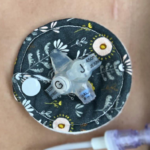Strategies for Developing Oral Feeding Skills in Tube-Fed Children
If you’re reading this, you likely have a child who relies on tube feeding, and you may be wondering if they will ever enjoy a meal at the family dinner table. First, take a deep breath. You’re not alone, and there is hope on the horizon.
At Applied Medical Technology, we’ve heard your concerns. While our feeding tubes are lifelines for many children, you’re dreaming of the day your little one might take their first bite of birthday cake or join in on family pizza night. Today, we’ll explore how to nurture those oral feeding skills while ensuring your child gets the nutrition they need.
We understand that this journey can feel overwhelming at times. You might be juggling medical appointments, therapy sessions, and the day-to-day challenges of caring for a child with complex needs. Remember, it’s okay to have moments of frustration or doubt. What you’re doing is incredibly important, and your dedication to your child’s well-being is admirable. Let’s take this journey one step at a time, celebrating every small victory along the way.
More Than Just Nutrition
We all know eating isn’t just about getting calories in. It’s about the joy of trying new flavors, the pride of learning to use a spoon, and those precious family moments around the dinner table. That’s why developing oral feeding skills matters, even for our tube-fed champions.
While research in this area is ongoing, clinical experience has shown that many tube-fed children can make progress with oral feeding. It’s not always easy, but it’s often possible.
Think about all the skills that come with eating:
- The oral motor skills of chewing and swallowing.
- The sensory experiences of different textures and temperatures.
- The hand-eye coordination of using utensils.
- The social skills of sharing a meal.
Even small steps in oral feeding can contribute to your child’s overall development in these areas. Plus, the bonding during feeding times—whether through a tube or by mouth—is invaluable. Your presence, your touch, your voice—all of these nurture your child in ways that go far beyond nutrition.
Challenges and Opportunities
It’s essential to recognize the challenges that come with developing oral feeding skills in tube-fed children:
- Your child may not be accustomed to oral stimulation
- Previous medical procedures might have created negative associations with oral stimuli
- Your child may have missed some typical feeding milestones
However, we encourage you to view these challenges as opportunities. Each presents a chance to introduce positive experiences, create new associations, and support your child’s development at their pace.
If you experience periods where progress seems slow or imperceptible, please know this is a normal part of the process. Every child follows a unique developmental timeline. The most crucial elements are consistency and a positive approach. Each positive oral experience you provide lays the foundation for future success.
Effective Strategies for Oral Feeding Development
While every child’s journey is unique, several general strategies are often discussed in the field of pediatric feeding. Here are some approaches you might consider exploring with your healthcare team:
- Start early, start small: Even a gentle touch around the mouth or lips can help. It’s all about positive associations.
- Team effort: Work with your speech therapists, occupational therapists, and nutritionists. They’re your allies in this journey.
- Make it fun: Explore flavors without pressure. It could be as simple as licking a flavored pacifier or having a tiny taste on the lips. Celebration-worthy? Absolutely!
- Exercise those muscles: Oral exercises can help, even when your child isn’t eating. It’s like preparing for the big game.
- Timing is everything: When medically appropriate, try offering a little taste by mouth during tube feeding. It can help your child connect the dots between eating and feeling full.
- You’re the expert: Nobody knows your child like you do. Your involvement in feeding therapy can make a world of difference.
- Tools of the trade: Special bottles, cups, or utensils might make things easier. Don’t be afraid to experiment.
Remember, consistency is key with these strategies. Incorporate them into your daily routine in a way that feels manageable for you and your family. The goal is to make oral experiences a regular, positive part of your child’s day. And don’t forget to take care of yourself, too – this journey requires patience and energy, so make sure you’re getting the support you need.
Navigating the Journey of Oral Feeding Development
Remember, this is a marathon, not a sprint. Every child’s journey is unique, and that’s okay. The goal isn’t necessarily to ditch the feeding tube completely. It’s about maximizing your child’s potential, whatever that looks like for them.
At Applied Medical Technology, we’re in your corner. Our products are designed to provide that crucial nutrition while leaving the door open for oral feeding development when the time is right. Keep working closely with your healthcare team. They’re there to help you balance nutritional needs with developmental goals.
As you move forward, try to keep a journal of your child’s progress. Note down new foods tried, reactions to different textures, or any oral motor improvements you observe. This can be incredibly encouraging on tough days, showing you how far you’ve come. It can also be valuable information to share with your healthcare team. And don’t hesitate to connect with other parents on similar journeys – their experiences and support can be invaluable. Remember, you’re not just feeding your child; you’re nurturing their overall development and building a foundation for their future.
While this article provides general guidance, it’s important to note that research in this area is ongoing. Every child’s situation is unique, and strategies should always be tailored to individual needs under healthcare professionals’ guidance. We encourage you to consult with your child’s medical team for the latest research and more specific advice. They can provide personalized recommendations based on your child’s needs.
Disclaimer: Anything contained in this blog is general information only and is not, nor should it be interpreted to be medical advice. Always consult with a qualified physician and/or a health care provider for medical advice.


